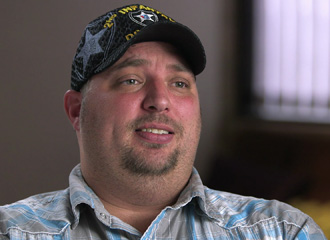Learn How Veterans Got Back on Track
4-minute read
Learn How Veterans Got Back on Track
4-minute read
Sometimes, treatment may not make a noticeable difference immediately. Maybe you don’t connect with your therapist in your first appointment. Or, maybe you feel like you’re taking all the right steps, but nothing’s changing.
This isn’t uncommon. Sometimes it may take awhile to find the right therapist or combination of treatment options for you — but the obstacles on your journey are speed bumps, not dead ends. Many Veterans have found their path to recovery even when it wasn’t clear right away.
It took Marcus, an Army Veteran, several tries before he found a therapy that worked for him. He had served in Iraq for about a year, at a time when IEDs suddenly came into heavy use. The change was dramatic enough that counselors were brought in to talk to his unit as a group. But, for whatever reason, Marcus says, he didn’t talk to them.
After returning home, Marcus found that members of his unit were dispersed far and wide, and his friends were scattered around the globe. Without his closest supporters nearby, he tried therapy to resolve the issues he was experiencing, but he didn’t connect with his first therapist.
For the next seven or eight months, Marcus muscled through his issues by himself, until one day, he was sent to recover a broken-down vehicle at a mortar range. The sounds of the explosions triggered severe anxiety. Despite his previous disappointing attempts to get help, Marcus sought therapy once again.
This time, he connected with a therapist who helped reduce the emotional sting of the traumatic events Marcus had experienced. The therapist also offered him breathing and relaxation techniques that helped relieve his anxiety.
“I think it makes me a better father for the help I got,” says Marcus, who is a single parent of two. “It’s consistently gotten better since I’ve been home … due to the counseling I received.”
As Marcus’ story demonstrates, Veterans may not feel a comfort level with the first, second, or even third mental health professional they see. But it’s important to keep searching for a therapist until you find the right match.
Jeff, a member of the U.S. Army National Guard, was jumpy, desperate, and emotionally guarded after a series of rough experiences during his service overseas. He had experienced rocket and mortar attacks that left him depressed — to the point that, after he returned home, his wife removed his weapons from the house. She urged him to get help, and eventually he sought support at his local Vet Center.
“The first two people I went to, I tried for two or three sessions, and … it didn’t feel right, it didn’t feel comfortable,” Jeff says. “I didn’t feel like, ‘This is someone that can hear my story.’” After several tries, Jeff found the therapist who was right for him and was treated for PTSD, traumatic brain injury, and generalized anxiety disorder.
I feel finding someone who you’re comfortable with is definitely key to healing and progression, and there’s someone out there.Jeff
“I feel finding someone who you’re comfortable with is definitely key to healing and progression, and there’s someone out there,” Jeff says. His therapy has included a physical component — which reawakened his lifelong interests in gymnastics and dance — as well as eye movement desensitization and reprocessing (EMDR), a psychotherapy treatment designed to ease the distress associated with traumatic memories.
“It’s hard to find someone that you’re going to trust to open up with,” Jeff says. And, along the way, “you don’t have to be afraid to walk out and be like ‘I’m sorry, I can’t work with you, but I’m going to continue to look for someone who I can work with.’”
Finding and connecting with a therapist can be challenging, but like most obstacles, it’s a speed bump — not a stop sign. Countless Veterans have overcome early setbacks to continue the journey toward a healthier life.

